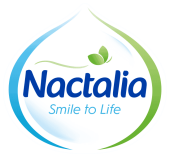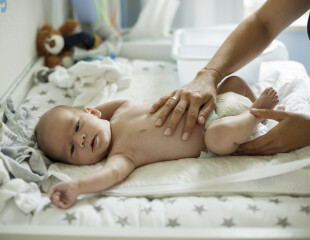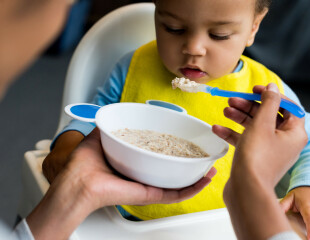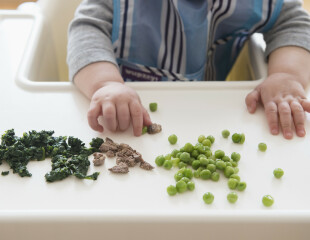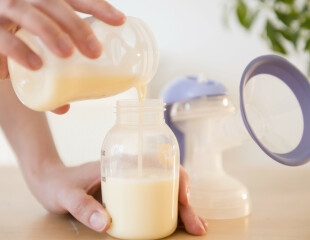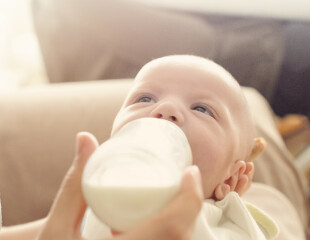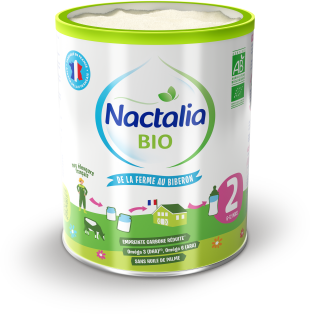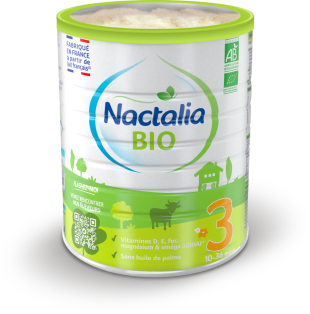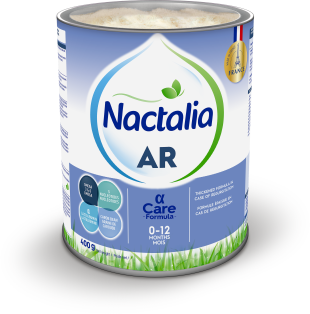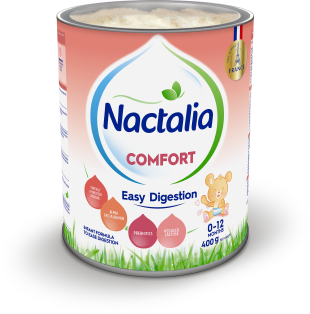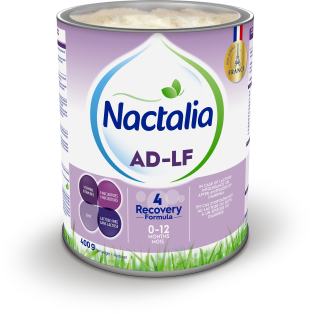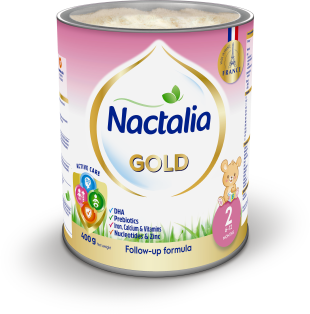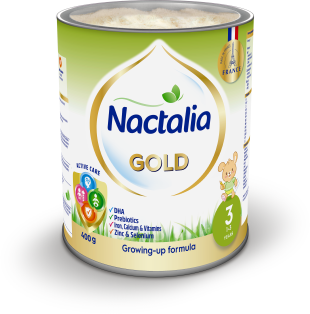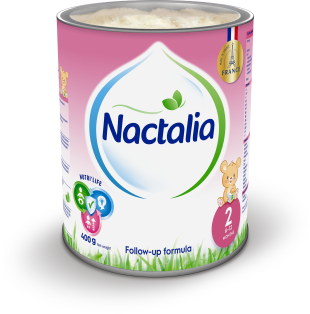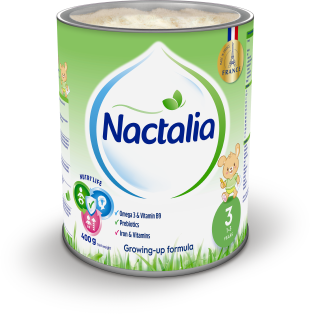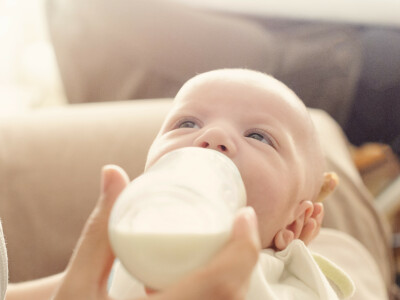
Regurgitation and digestive problems
Regurgitation, gastro-oesophageal reflux, diarrhoea, constipation, milk intolerance… Digestive problems are common in babies. Whilst some of these problems are benign, others require particular care and attention. Do you need advice and recommendations to help you get through these problems? Let yourself be guided!
Regurgitations are commonplace and trivial in babies
A little reflux here, a little reflux there… These regurgitations, which are referred to as “physiological regurgitations” are very normal in newborns and generally occur a short while after a meal. They are painless and don’t seem to upset baby generally speaking. Whilst these regurgitations can be surprising, you can be reassured in the knowledge that the actual volume of milk that is regurgitated is less than it appears…There is no impact on baby’s growth, even if baby regurgitates very frequently. The regurgitations are the result of a diet that is essentially fluid and the significant volumes of milk consumed compared with the actual size of the stomach in a child in a lying position and whose stomach has not yet developed its anti-reflux anatomy and physiology. These regurgitations don’t mean that the child is not digesting their milk.
On the other hand, if they seem to be too abundant and cause excessive crying, consult a healthcare professional.
EXPERT ADVICE: how to soothe and prevent “simple” regurgitations?
- Ensure you are in a calm environment to feed baby.
- Ensure baby is correctly positioned: vertical, with their back well-supported.
- Don’t give baby too much milk in one go. Take little breaks during the breastfeed or bottle and help baby expel any air they may have swallowed by burping. Hold you baby in a vertical position against you whilst gently patting their back to encourage burps. Changing baby’s nappy in the middle of a feed is an opportunity for a break and often prompts a burp.
- If you are bottle-feeding your baby, choose a suitable teat with flow that is neither too fast nor too slow, and preferably use bottles with a valve at the bottom so that air does not only enter the bottle through the teat.
- Loosen baby’s nappy off as much as possible and avoid tight clothing to avoid compressing the stomach.
- Avoid “jostling” baby after meals.
- Avoid a seated position (maxi cosi seat) after meals; raise the head-end of their bed slightly and never put them down on their stomach.
- If symptoms persist, you may want to change milk and opt for milk with a thickened formula or an anti-regurgitation milk. A healthcare professional will be able to advise you.
Gastro-oesophageal reflux (GOR): it gets more complicated!
Sleeping problems, significant regurgitation, pain and irritability… Whilst some forms of regurgitation are not cause for concern, others can give rise to complications.
Pathological GOR can cause oesophagitis accompanied by considerable crying, the appearance and aggravation of respiratory or ENT disease and discomfort with a tailing off in baby’s weight gain curve.
Note that a GOR diagnosis of this kind is rare and that babies generally experience benign regurgitation. If you are in any doubt, ask your doctor to examine your baby. They will prescribe suitable treatment.
Diarrhoea: upset little stomach
A bottle-fed baby’s stools are generally brown, sometimes greenish, and fairly solid. On the other hand, a breastfed baby’s stools are yellow, fairly soft or even liquid. It is completely normal to observe a change in colour and rhythm from one day to the next. Digestive transit varies from baby to baby. So, provided that they are eating and growing correctly and sleeping and gurgling as usual, there is nothing to worry about!
Only if stools suddenly become very liquid and abundant and your baby seems to be suffering and in pain is it diarrhoea. There are various causes: gastro-enteritis, poorly prepared bottle, allergy, etc… Consult a doctor who will prescribe suitable treatment.

EXPERT OPINION: what should I do if my baby has diarrhoea?
- Wash your hands and baby’s hands.
- Handle food and milk with precaution.
- Ensure that baby does not become dehydrated: weigh them often to check this. Give them small quantities to drink regularly and frequently. You need to give them as much oral rehydration solution as they will take. It contains sugar and mineral salts (sold in pharmacies).
If they begin to lose weight, consult your doctor immediately.
Constipation: the need to re-establish a rhythm
Baby may frequently experience problems in expelling their stools. If they eventually manage and there are no traces of blood, there is no cause for alarm.
It is a different matter, however, if baby is red, crying, their stomach is strained and their stools are hard with traces of blood. Consult a doctor who will prescribe suitable treatment.
Note that after a few weeks of breastfeeding, stools generally become less frequent, or even very infrequent, causing no discomfort in the child: this mock constipation in breastfed children does not require treatment.
EXPERT ADVICE: how can I help my baby to stop suffering from constipation?
- Gently lift and straighten their legs several times: a movement that will help them relax. To encourage them to expel a stool, you can fold their thighs back up against their stomach.
- Massage their stomach in a clockwise direction.
- Ensure that they are hydrated and give them water with a low mineral content (dry residue at 180° less than 500mg/litre), but limit their intake of Hépar water as it is not suitable for their little kidneys.
- A glycerine suppository may help, but should only be used infrequently.
- Never use a thermometer to try and prompt evacuation of the stool: there is a risk of bleeding.
If your baby is severely constipated, your doctor may advise you to use a “transit”-type milk
Cows milk protein intolerance
Regurgitations, crying, diarrhoea, skin problems, coughing, slow or no weight gain… These are all possible symptoms of cows milk intolerance. It affects about 2% of children. Note that if there are close family members who suffer from milk intolerance, the risk of your baby suffering is increased.
It is sometimes difficult to distinguish between cows milk protein intolerance and GOR. To ensure that the correct diagnosis is made, consult your doctor. In certain types of cows milk protein intolerance, biological examinations (presence of anti-milk antibodies and skin tests) are required to make the diagnosis, but very often these tests are negative when in fact the baby is suffering from a cows milk protein intolerance. The only sure way to make a diagnosis is to carry out a milk-free dietary test for 3-4 weeks using a specific infant formula (hydrolysate).

ZOOM: which milk should I use in the event of a cows milk protein intolerance?
To replace the traditional infant formula, which are generally predominantly made using cows milk, your doctor will suggest a hydrolysate formula (the proteins are broken down into tiny fragments using enzymes, thereby reducing its allergy-inducing properties). These milks are sold in pharmacies only and two types are available:
- Cows milk protein extensive hydrolysate formula
- Rice protein hydrolysate formula.
You will need to avoid any food containing milk when you introduce new foods into your baby’s diet.
If hydrolysate formula is not suitable or if your baby’s intolerance is severe, you may be offered an amino acid-based preparation.
